A Message To Parents & Coaches of Youth Players

[Video Transcript]
Hi sports parent, I’m Craig Sigl, youth sports mental toughness trainer and I’m going to give you, from my experience in working with hundreds of kids in person, and thousands online worldwide, a
Deep insight into how and what kids think
so that you can be the best possible parent shepherding them to the success and happiness you want for them.
 I’m also a parent of 2 athletic boys myself and I know intimately, right there with you, How much we as parents care about our kids success in life.
I’m also a parent of 2 athletic boys myself and I know intimately, right there with you, How much we as parents care about our kids success in life.
You see, when I was growing up, I was always the smallest in every class, on every team.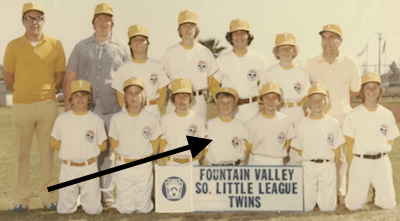 I didn’t even start growing until I was a junior in high school. I was picked on, bullied and only found relief by becoming unseen….hiding from everyone. My parents had no idea what I was going through because I didn’t tell them. They had a feeling about it and would ask me periodically how I was doing but I would respond with all sorts of versions of “I’m fine.”
I didn’t even start growing until I was a junior in high school. I was picked on, bullied and only found relief by becoming unseen….hiding from everyone. My parents had no idea what I was going through because I didn’t tell them. They had a feeling about it and would ask me periodically how I was doing but I would respond with all sorts of versions of “I’m fine.”
I’m sure they just thought: “He’ll grow out of it” or “Every kid goes through this.”
But I wasn’t fine. I just took it and held it all in, and carried with me for years, even decades. I carried around a lot of
Destructive belief patterns
around the idea of “I’m small” that were THE cause of many of my problems in my marriage and held me back in my earlier career as a corporate manager.
Those feelings of insecurity and beliefs about “being small and weak” infected my entire life…all from just a few crucial years where I formed the basis of my identity based on tons of fears.
I vowed this was not going to happen to my boys and maybe I wasn’t a perfect parent, but I am very proud to say that I was successful in raising 2 fearless young men, both of whom inherited my short stature but operate in the world like they are 10 feet tall!
This is why I do this work. To help your kids in the same way. 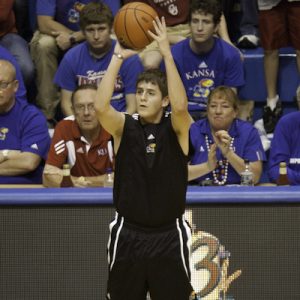
I’ve seen bigger kids who self destruct after everyone catches up to them or can’t handle the expectations. I’ve seen good-looking popular kids who can’t handle the pressure of having to keep up the cool act and manage their group. I’ve seen countless
kids who perform brilliantly in practice but melt down in competition.
Many more who are far too hard on themselves and can’t deal with mistakes and losing.
Whatever they are learning and believing today about themselves through these experiences is going to stick with them a LONG time.
Good or bad. So listen….If you hear any sort of negativity from them out loud, believe me that’s the tip of the iceberg… what’s going on inside their head is 100x worse.
These destructive beliefs are being formed and solidified right under your nose and even in the best of family environments, let alone where there is divorce, conflicts, and other home life issues. Tack on the constant struggle to fit in and be accepted, the pressure to meet yours and their coaches expectations, their bodies changing and hormones ranging and you’ve got the makings of serious mental baggage to carry around for a long time.
Now, you might be thinking,
“but Craig, this has always been the case, even in my generation!”
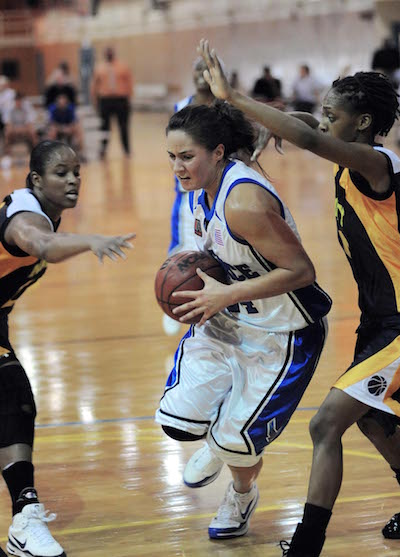 And I’d answer you back with
And I’d answer you back with
“That’s true but we didn’t have year-round sports, global competition for playing spots and scholarships, and of course, let’s not forget or minimize technology and social media.”
In some studies, it has been shown that
1/3 of all kids have been hit with Cyber bullying!
In other words, whatever used to happen to us, with today’s technology now happens 10x faster and more exaggerated. Think about it, it only makes sense. If you got picked on as a kid in my generation once in awhile at school, now you can get picked on 24 hours a day!
The bottom line?
We need to prepare and
steel our kids with what I call Mental Toughness
using the kids’ self interest in sport to learn it
My definition of mental toughness is:
Focused, Confident, Determined, and Resilient, especially under pressure.
So, yes, we are going to
Use sports as the vehicle for your kids to learn personal development and life skills.
Something they would never do otherwise. Try asking a kid:
“Hey want to do some personal development and learn how to be more self aware and confident which will help you in life?”
and see how they respond.
But, instead ask them,
“How would you like to perform in a game like you do in practice?” or “How would you like to feel totally confident going into every game? How much better would you play?”
and you will hear a much better response.
Get this… you and I can deliver the confidence and success mindset and clear the fears and other internal blocks…under the radar using THEIR self interest in improving in their sports performance. Something they are already motivated for.
And, oops, oh yes, they improve their sports performance too and that’s how we present it to them but lifetime mental skills will be our little secret, ok?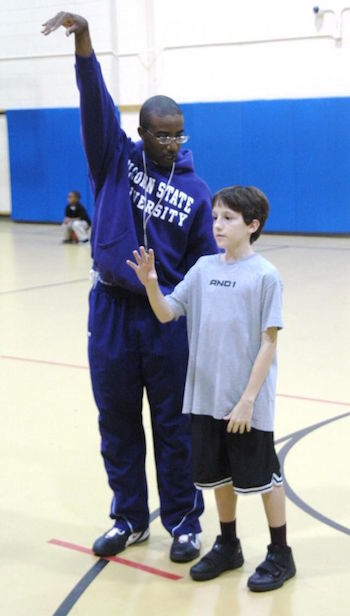
That’s why I do this work. That’s my mission.
That’s the great thing about sports for our youth, the positive lessons learned that carry through to adulthood such as:
- discipline,
- teamwork,
- respect,
- resilience,
- coachability,
- self confidence,
- courage to set a tough goal and go for it,
- etc.
On the other hand, many many kids, probably yours, are instead ingraining destructive belief programs from their sports participation just like I did.
Now, let me save you from some pitfalls in attempting to teach your kid these valuable life and sports mental skills.
Here’s your options:
-
- The parent directly teaching the kid. First off, you will constantly be Fighting the inborn program your child has to become independent from you. Second, they intrinsically know that you have ulterior motives for them with your advice. You are not objective and they know that. Like when you give them a compliment, for example, they often think: “You have to say that, you’re my mom/dad.” or

- The parent directly teaching the kid. First off, you will constantly be Fighting the inborn program your child has to become independent from you. Second, they intrinsically know that you have ulterior motives for them with your advice. You are not objective and they know that. Like when you give them a compliment, for example, they often think: “You have to say that, you’re my mom/dad.” or
Haven’t you ever had your kid say they heard something from someone else that was just amazing to them and yet, it was almost the exact same thing you said in the past but when you said it, you only got eye rolls…?
Yep, it’s happened to me with my own kids too. It’s totally normal.
Third, thinking “My dad or coach taught me this way and it worked for me so it will work for my son or daughter.” So many parents make this mistake projecting themselves onto their kids. Your kid is not a mini version of you. He or she is as unique in personality and thinking as a stranger. Failure to get this leads to many kids coming to me with serious performance anxiety issues and a damaged parent/child relationship.
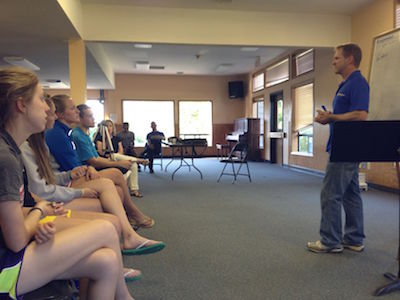 Do yourself a favor and let me do the teaching for you, I’ve been doing this with kids for a long time now and know how to speak at their level. They are much more likely to hear this from a stranger with credibility than you. Even better, go through my training with them and integrate the lessons with your family’s values.
Do yourself a favor and let me do the teaching for you, I’ve been doing this with kids for a long time now and know how to speak at their level. They are much more likely to hear this from a stranger with credibility than you. Even better, go through my training with them and integrate the lessons with your family’s values.
2. Teaching from a typical sports mental game book. Look, there’s some good stuff in those books. I’ve read just about all of them. But, here’s the thing….the problem with most of that info is that it is not written for youth sports. They are written by sport psychologists who work with top athletes which is an Entirely different game and set of issues than what a 15 year old faces, let alone a 10 year old. Much of it simply just doesn’t apply.
And secondly, most of the advice is what I call “Mental band aids” at best. Here’s what I mean:
When an athlete asks me: What do I do when I’m really nervous before competition and can’t calm down? Your typical mental game book will say something about deep breathing, play in the present moment and believe in yourself.
I tell the athlete, even the young ones, listen, here’s the better question I’d like you to ask me:
Craig,
How can I STOP being nervous before competition?
That’s the question I want to hear and I’ve got answers.

You see, what makes my work different is that I am all about going to the CORE and the CAUSE of the problem and eliminate it there.
This is the essence of my process I call the
R.A.C.E. Formula
R is Relentless and it means to be relentless in your belief that you can change whatever isn’t working for you. Without this, nothing changes. Without this, nothing changes and you stay stuck in your problem.
A. is Awareness which builds relentless through an understanding of how we operate. That’s right, I’ve been teaching kids as young as 7 that they have a thinking mind and a power mind (conscious and unconscious mind). When they get this, then they can make changes at the level of the control mechanism of the nervous system. That’s where we go!
C. is Clear and that is simply clearing out the mental baggage, the belief programs that interfere with performance. The most common one is “I’m not good enough”
How much of that one have you carried forward from your childhood? Wouldn’t you like your kids to clear that? Wouldn’t that set them up for a much better shot at success and happiness for the rest of their life? This is your shot, take it mom and dad. My foundational principle for everything I do is:
Performance = Potential – Interference.
Clear the interference and you perform to your potential.
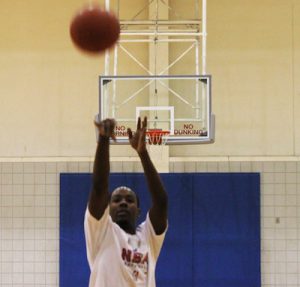 E. is Emotional mastery and I don’t think I need to tell you how important Controlling your emotions in sports is, do I? Might be useful in the rest of their lives too, eh? But really, emotional mastery leads down the path to being fearless and is the end goal in Overcoming performance anxiety, the most common problem for young athletes. My RACE formula is built into this program.
E. is Emotional mastery and I don’t think I need to tell you how important Controlling your emotions in sports is, do I? Might be useful in the rest of their lives too, eh? But really, emotional mastery leads down the path to being fearless and is the end goal in Overcoming performance anxiety, the most common problem for young athletes. My RACE formula is built into this program.
Finally, if you’re now convinced like thousands of other parents worldwide who have taken advantage of my programs for these kids, if you’re now convinced that you need to take some kind of action to ensure that your kid gets instilled a success mindset, then
The next step is get your kid on board with this training.
Here’s my simple advice. Do NOT present going through this training as a mental training. They don’t get that and may reject it. You need their buy in and motivation to WANT to do this training. Instead, Present it as a SOLUTION to whatever they are struggling with that they are aware of. Like this:
“Son, are you interested in hearing any suggestions from me for how you can improve your game? If yes, then, “I noticed that you play far better, more aggressively, more confidently and smoothly in practice than in that last game. I asked coach if he thinks that and he agrees. Do you notice a difference in how you play from practice to game?”
If yes, then,
“Would you be interested in a solution to that?” If yes, THEN you can tell them about this training.
“I’ve looked at it and it’s designed specifically for that problem. All the practice in the world won’t fix that problem.” Would you like to do it?”
or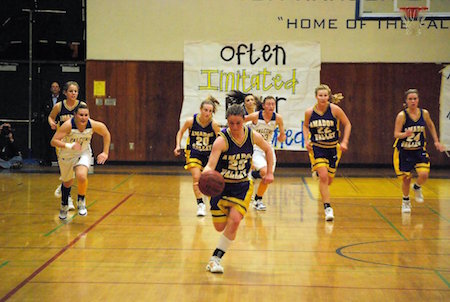
“Daughter, I heard you mention after your last game that you get so Nervous and/or lose your confidence right before and sometimes during a game. If there was a solution for that, would you be interested?”
Follow me parents? You’ve got to Frame this in terms of their self interest. And by the way, always ASK if they would like your help. Your advice will go MUCH farther if they have given you permission to give it to them. If they say, no, come back and ask another time. When they are sick and tired of their problem enough, they will say yes.
Ok mom and dad. If you’ve gotten this far, you are clearly a 1% parent and I sincerely applaud you, and your kid is very lucky to have you. Most parents are far more checked out and just think their kid will be fine or some magic will happen that allows their kid to overcome these problems. because
You are a 1% parent, you are raising a 1% kid
and you can be very proud. I feel extremely privileged to be a part of that and my heart nearly explodes with joy when I hear back from parents and kids how my training has positively changed their lives. That’s why I do this work. I can’t wait to hear about your family’s successes.
I’m Craig Sigl the mental toughness trainer
Let’s do this

